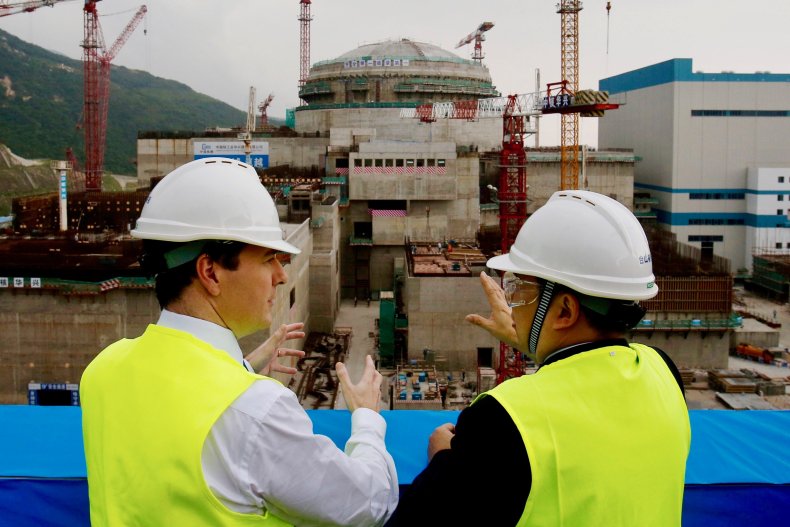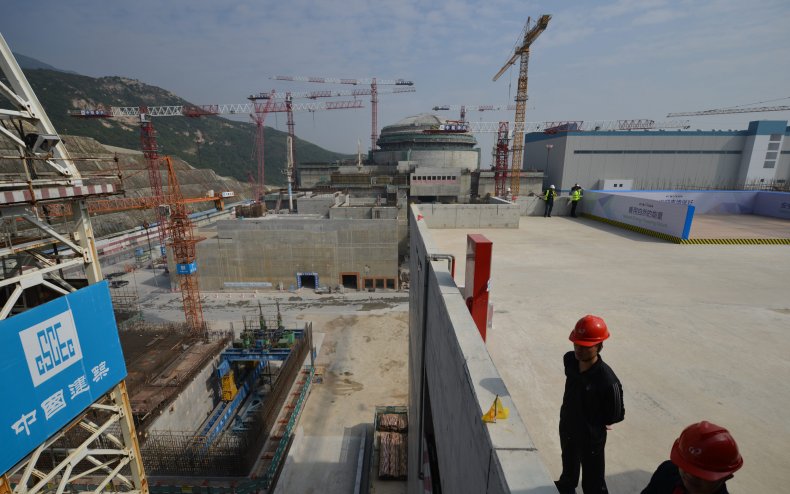BY JACK DUTTON
The U.S. government reportedly spent the last week assessing allegations of a leak at a Chinese nuclear power plant, after a French company that part-owns and helps operate it warned of an "immediate radiological threat."
The Chinese plant denied the allegations and said that its generators are functioning normally, evoking memories for some of the lack of transparency around previous nuclear disasters.
A letter from France-based Framatome to the U.S. Department of Energy warned that the Chinese safety authority has been raising the acceptable limits of radiation detected outside the Taishan Nuclear Power Plant in Guangdong province in order to avoid having to shut it down, CNN reported on Sunday.
The letter sought to obtain a waiver to share U.S. technical assistance with the Taishan plant, claiming that the radiation limits were above French safety standards.
Framatome, a designer and supplier of nuclear equipment and services that's owned by Électricité de France, was contracted to help construct and operate the plant.
The Biden administration doesn't yet believe the situation is at "crisis level", an anonymous U.S. official told CNN. Newsweek has contacted the U.S. Department of Energy for comment.
"Framatome is supporting resolution of a performance issue with the Taishan Nuclear Power Plant in Guangdong Province, China," a spokesperson for Framatome said in an emailed statement to Newsweek.
"According to the data available, the plant is operating within the safety parameters.
"Our team is working with relevant experts to assess the situation and propose solutions to address any potential issue."
However, a June 8 memo seen by CNN sent by the company's subject matter expert to the U.S. Energy Department called the situation "an imminent radiological threat."
"The situation is an imminent radiological threat to the site and to the public and Framatome urgently requests permission to transfer technical data and assistance as may be necessary to return the plant to normal operation," the memo said.
The memo also reportedly claimed that the Chinese limit was increased to exceed French standards, but it is unclear how that compares with the U.S. threshold. The French company declined to comment on the memo when asked about it by Newsweek.
The National Security Council held multiple meetings last week about the incident, officials told CNN. Sources added that the Biden administration and the Department of Energy had discussed the situation with the French government. Officials said that the Washington has also contacted Beijing about the alleged leak.
The Taishan Nuclear Power Plant on Sunday said the accusations of dangerous levels of radiation leakage were untrue and that its two reactors met the safety requirements and were operating normally.
"Recently there have been some agencies and media organizations paying attention to and inquiring into the situation at the Taishan Nuclear Power Plant," the plant said in a statement on its website on Sunday.
The plant said the second of its two Evolutionary Power Reactors had completed a planned overhaul and the facility had been operating again normally since June 10.
"All operating indicators of the two units have met the requirements of nuclear safety regulations and technical requirements for power plants," it said.
The plant said it had not detected unusual amounts of radiation inside or outside the facility. "According to continuous monitoring data, environmental indicators at present are within their normal range for both the Taishan plant and its surrounding environment," the statement said.
 Then British Chancellor of the Exchequer George Osborne talks with Guo Liming of Taishan Nuclear Power Joint Venture Co Ltd (R) as he tours a nuclear reactor under construction at Taishan power plant on October 17, 2013 in Taishan, Guangdong province, China. The U.S. government reportedly spent the last week assessing allegations of a leak at a Chinese nuclear power plant.GETTY IMAGES
Then British Chancellor of the Exchequer George Osborne talks with Guo Liming of Taishan Nuclear Power Joint Venture Co Ltd (R) as he tours a nuclear reactor under construction at Taishan power plant on October 17, 2013 in Taishan, Guangdong province, China. The U.S. government reportedly spent the last week assessing allegations of a leak at a Chinese nuclear power plant.GETTY IMAGESNewsweek previously reported that allegations of the leak at the plant received little attention in China, with no state media outlets reporting the issue and there being almost no discussion on social media platforms.
The reports are stoking concern, evoking memories of the Chernobyl nuclear disaster in 1986, when the Soviet Union played down issues with radiation levels at one of its nuclear plants. The evacuation of the plant began one and half days before the accident was publicly acknowledged by the Soviet Union. Although the UN estimates that fewer than 50 deaths were attributed to the disaster, thousands died after as a result of high radiation exposure.
The nuclear plant revelations come as tensions are brewing over the G7 summit that took place in Cornwall, England, over the weekend.
China is not part of the Group of 7, but it is part of the Group of 20. The Chinese embassy in the UK said on Sunday that the days when "global decisions" were dictated by a "small group of countries are long gone."
The G7 called out Beijing in its final communique on Sunday, saying that it needed to do more to respect human rights and to conduct a "timely, transparent, expert-led, science-based" investigation into the origin of COVID in China.
"We are concerned by the use of all forms of forced labour in global supply chains, including state-sponsored forced labor of vulnerable groups and minorities, including in the agricultural, solar, and garment sectors," the G7 said.
The group of states also addressed Hong Kong. "We will promote our values, including by calling on China to respect human rights and fundamental freedoms, especially in relation to Xinjiang and those rights, freedoms and high degree of autonomy for Hong Kong enshrined in the Sino-British Joint Declaration and the Basic Law," it said.
 Workers wait for French Prime Minister Jean-Marc Ayrault to arrive at the joint Sino-French Taishan Nuclear Power Station outside Taishan City in Guandong province on December 8, 2013. The plant has denied reports of a nuclear leak there, after a French company that partly owns and helps operate it warned the U.S. government of an “immediate radiological threat.”PETER PARKS
Workers wait for French Prime Minister Jean-Marc Ayrault to arrive at the joint Sino-French Taishan Nuclear Power Station outside Taishan City in Guandong province on December 8, 2013. The plant has denied reports of a nuclear leak there, after a French company that partly owns and helps operate it warned the U.S. government of an “immediate radiological threat.”PETER PARKS
No comments:
Post a Comment